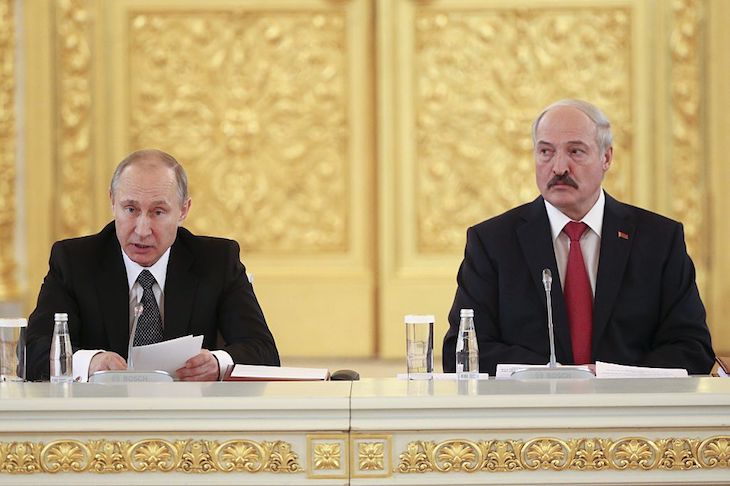What will Vladimir Putin do next? Since Russia annexed Crimea in 2014, discussions about Russia in the west have been preoccupied by two questions: which other countries does Russia have territorial ambitions in? And what is Putin’s plan for when his presidential term expires in 2024? The answer to both of these questions could lie in an often overlooked country: Belarus
When Putin’s presidency officially ends, the Russian constitution prevents him from seeking another term in office. Putin could, of course, change the rulebook. He did this before by switching roles with prime minister Dmitry Medvedev in 2011. But a repeat of this looks unlikely: the head of Russia’s Constitutional Court has strongly suggested that the constitution cannot be amended. What’s more, his ‘castling’ move was met with a widespread public backlash and sustained protests across the country; instability that the Russian authorities are anxious not to repeat.
So if Putin does step down, he will want to make sure of two things: that he retains significant influence over the political environment in Russia; and that his successor is loyal, but powerful enough to guarantee his and his family’s safety. To achieve this, Putin could become head of the security council or a senior presidential aide. But there has been growing speculation that he is looking to Russia’s neighbour, Belarus, for his political future.
In December, Putin met with Belarusian president Alexander Lukashenko three times, officially to engage in crisis talks about an ongoing oil tax dispute (Belarus receives Russian oil which it refines and exports). But while the discussions over oil duties did not yield results, Putin did reveal that he has been considering deeper political integration with Belarus.
Since 1999, Belarus and Russia have technically been part of the Union State, a largely symbolic alliance that allows them to share military and intelligence ties, but not a single currency, government or flag. Since Putin and Lukashenko’s meeting, there have been comments from the Russian authorities, including prime minister Medvedev, that suggest Russia intends to formalise this union. This year marks the 20th anniversary of the Union State agreement, which may be why this discussion has come to the fore.
There have also been other nascent signs that Russia is pursuing a different tack in its relationship with its eastern neighbour. Last August, Russia appointed a new ambassador to Belarus, Mikhail Babich. He is thought to be close to Putin and has a background in the security services – a departure from Russia’s usual approach which is indicative of the view in Moscow that Belarus may need to be called to heel. This does not suggest that Russia would pursue a land-grab similar to its annexation of Crimea – Belarus is a military ally that Russia cannot risk alienating and deeper integration will more likely be pursued with creeping legislation.
While Lukashenko presides over a repressive political environment that does not permit dissent, he is eager to stimulate the economy by attracting foreign investment and loan agreements from the EU. But these loans come with the unattractive condition of political liberalisation that could reduce Lukashenko’s control, and so he must balance this by maintaining an economic relationship with Russia. This has led to an unsettled diplomatic relationship that has been particularly strained since Russia’s annexation of Crimea. Belarus criticised the annexation, expressed concerns that its territory may be at a similar risk and maintained good relations with Ukraine throughout the conflict. Belarus also hosts the Minsk peace agreements – designed to broker a diplomatic solution to the conflict in eastern Ukraine.
Russia and Belarus periodically disagree over oil and gas prices, with Belarus pushing for below-market rates from Russia and accusing it of using economic measures to coerce Belarus into falling in line. Belarus has also resisted Russia’s attempts to construct a military base on its territory, cautious that this would jeopardise its somewhat improving relationship with the West.
Despite noises from Moscow, it is not clear what a union with Belarus would look like. The Union State is controlled by the State Council, which advises the Russian presidency. Putin could technically become the head of this body, but it lacks any real executive powers over Belarus. Moreover, Lukashenko flatly denied any unification plans were in the pipeline and he would resist the establishment of any institution that would challenge his political control.
Notwithstanding Belarus’s reticence, the Russian administration appears to be taking the idea of unification increasingly seriously. The foreign minister and well-known media figures have publicly lent credence to the idea. Russia knows practical unification would be economically detrimental: Belarus’s economy is much smaller and in significant debt. But these ongoing discussions, which could deepen political and legislative cooperation between them, may be laying the groundwork for a future deal.






Comments